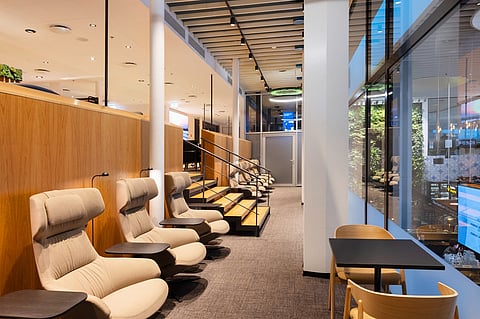UAE travellers want more sleeping pods, seats for introverts, spas in airport lounges: Report
Airports have evolved beyond being mere transit hubs

Dubai: As air travel continues to boom, with global passenger numbers projected to exceed five billion in 2025, travellers in the UAE are increasingly expecting more from their airport experiences, particularly within business lounges.
A recent analysis of passenger hospitality trends suggests a growing demand for amenities catering to diverse needs, including dedicated spaces for rest, privacy, and well-being. Patrik Bayardo, Head of Hospitality at Aviator Airport Alliance, a full-range provider of aviation services and a family member of Avia Solutions Group, said, “Airports have evolved beyond being mere transit hubs.”
Some time ago, business lounges were exclusive perks for frequent flyers, but now they have transformed into strategic assets reflecting ever-growing passenger expectations, said Bayardo.
He said, “These spaces are no longer just about comfort. They can generate substantial non-aeronautical revenue and be an important addition to the airport, enhancing traveller interaction.”
What do travellers want?
The global trends identified by Bayardo resonate with the demands of the modern, connected passenger. Among the key expectations are:
Sleeping Pods: With long layovers and overnight flights common for UAE travellers connecting through Dubai and Abu Dhabi, the need for private spaces to rest and rejuvenate is rising.
Seats for Introverts: Recognising that not all travellers seek social interaction, dedicated quiet zones with comfortable, private seating are becoming increasingly desirable. This caters to those who prefer to work, read, or unwind in solitude before flight. Such seats were a major attraction at Qatar's Hamad International Airport's newly expanded Concourses E and D.
Spas: A focus on well-being is a significant trend in travel. Including spa facilities within airport lounges would allow passengers to de-stress and refresh before or after their journey.
Beyond these specific demands, the analysis points to broader trends shaping the future of airport lounges:
Personalisation: Passengers expect services tailored to their preferences, leveraging technologies like AI to customise food and beverage choices, seating arrangements, and entertainment options.
Technology Integration: Digital access systems, such as biometric authentication and mobile check-ins, are crucial for enhancing convenience and reducing operational costs. Self-service innovations like digital food ordering and automated bars are also gaining traction.
Sustainability: Modern travellers are increasingly environmentally conscious, leading to a demand for lounges that incorporate smart energy management, waste reduction technologies, and eco-friendly materials.
The trend is towards more flexible and personalised lounge experiences, with some airports moving towards in-house operations to have greater control over passenger experience and revenue streams, said Bayardo. He explained that this includes the development of customised lounge services designed for specific traveller segments, such as business executives, families, or leisure travellers, and even the emergence of private terminals.
Sign up for the Daily Briefing
Get the latest news and updates straight to your inbox





